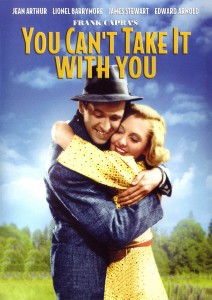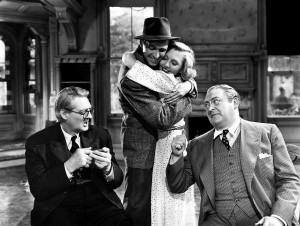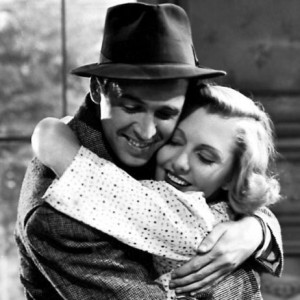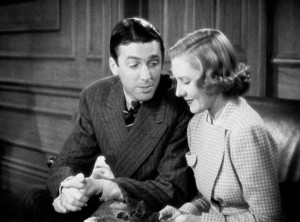The second Oscar-winning comedy in the 1930s, after It Happened One Night (in 1934), was also directed by Frank Capra for Columbia Pictures, You Can’t Take It With You, in 1938.
The ensemble-driven movie is based on George S. Kaufman and Moss Hart’s Pulitzer-Prize winning stage hit, adapted to the screen by Capra’s reliable collaborator, Robert Riskin.
Our Grade: B (***1/2* out of *****)
| You Can’t Take It with You | |
|---|---|
Visually and in terms of pacing, “You Can’t Take It With You” is weaker than the other Capra comedies of the Depression era, perhaps a result of too much respect for the theatrical cache of the piece.
Our review of Capra’s 1934 Oscar-winning comedy:
A zany comedy, about a madcap family believing in free enterprise, the film is an ensemble piece–there is really no major protagonist–in which each member is dedicated to his and her own crazy habits or personality traits.
Jean Arthur plays Alice Sycamore and Jimmy Stewart is Tony Kirby. The two fall in love, but there’s a problem: His family is wealthy and snobbish and hers is freewheeling and eccentric.
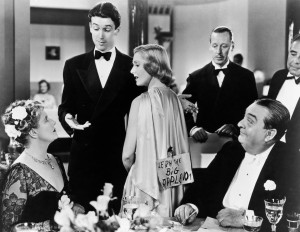 Alice’s grandfather, Martin Vanderhoff (Lionel Barrymore), dropped out of the rate race years ago. He has never paid income tax, because, as he says, “I don’t believe in it.” Early one, he states: “Everybody over at our place does just what he wants to do.” Asked by Mr. Poppins (Donald Meek) who takes care of his family, he quickly replies: “The same one that takes care of the lilies of the field, Mr. Poppins. Except that we toil a little, spin a little, have a barrel of fun. If you want to, come on over and be a lily.” Alluding to how times have changed, Martin says: “Lincoln said, ‘With malice toward none, with clarity to all.’ Nowadays, they say, ‘Think the way I do, or I’ll bomb the daylights out of you.”
Alice’s grandfather, Martin Vanderhoff (Lionel Barrymore), dropped out of the rate race years ago. He has never paid income tax, because, as he says, “I don’t believe in it.” Early one, he states: “Everybody over at our place does just what he wants to do.” Asked by Mr. Poppins (Donald Meek) who takes care of his family, he quickly replies: “The same one that takes care of the lilies of the field, Mr. Poppins. Except that we toil a little, spin a little, have a barrel of fun. If you want to, come on over and be a lily.” Alluding to how times have changed, Martin says: “Lincoln said, ‘With malice toward none, with clarity to all.’ Nowadays, they say, ‘Think the way I do, or I’ll bomb the daylights out of you.”
Later on, Martin tells Tony’s father, Anthony Kirby (Edward Arnold): “Maybe it’ll stop you trying to be so desperate about making more money than you can ever use. You can’t take it with you, Mr. Kirby. So what good is it? As near as I can see, the only thing you can take with you is the love of your friends.”
Alice’s mother (Spring Byingron) dabbles in painting and sculpture, and starts writing when a typewriter is delivered to the house by mistake. Alice’s sister, Essie (Ann Miller), spends her days practicing to be a ballet dancer, coached by Kalenkhov, a flamboyant Russian played by Mischa Auer, who says, “Confidentially, she sinks.”
Alice’s father (Samuel S. Hindes) is in the basement inventing fireworks, while Essie’s husband, Ed (Dub Taylor), is printing up leaflets that innocently get the family investigated by the police for subversion. Eventually, the head of the Kirby household (Edward Arnold) comes to visit Alice’s family, and fireworks, both figurative and literal, ensue.
Alice explains to Tony the origins of their lifestyle: “You ought to hear Grandfather on that subject. You know, he says most people nowadays are run by fear…So, he kind of taught all of us not to be afraid of anything, and to do what we want to do, and well, it’s kind of fun anyway.” It takes Tony Kirby some time to realize the eccentricities of Alice and her family: “Living with them must be like living in a world Walt Disney might have thought of.”
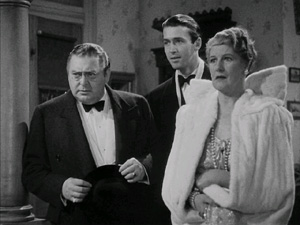 All the performances are good, but my favorite is Donald Meek, as Poppins, a man whose habit is sneaking on the family and scare them with his various Halloween masks. The following year, Meek, a distinguished character actor, excelled again in tow John Ford pictures: “Stagecoach,” as the liquor salesman, and “Young Mr. Lincoln.”
All the performances are good, but my favorite is Donald Meek, as Poppins, a man whose habit is sneaking on the family and scare them with his various Halloween masks. The following year, Meek, a distinguished character actor, excelled again in tow John Ford pictures: “Stagecoach,” as the liquor salesman, and “Young Mr. Lincoln.”
Nominated for seven awards, the comedy won two: Picture and Director. The film boasts a large excellent cast, of which only Spring Byington was nominated for Supporting Actress, as Penny, the eccentric mother. Strangely, Jimmy Stewart and Jean Arthur, as the romantic couple, Lionel Barrymore as the charming grandfather, and Edward Arnold, as the stuffy millionaire, were not singled out by the Academy for their acting.
Seen from today’s perspective, “You Can’t Take It With You” is an entertaining but overrated comedy, and one that doesn’t belong in Capra’s pantheon of great films, such as the previous “It Happened One Night,” or the later “It’s a Wonderful Life.” Capra’s helming is uncharacteristically stagy, betraying the theatrical origins of the piece.
Oscar Alert
Oscar Nominations: 7
Picture, produced by Frank Capra
Director: Frank Capra
Screenplay: Robert Riskin
Supporting Actress: Spring Byington
Cinematography: Joseph Walker
Film Editing: Gene Havlick
Sound Recording: John Livadary
Oscar Awards: 2
Picture
Director
Oscar Context
Capra’s You Can’t Take It With You competed for the Best Picture with nine other films: The Adventures of Robin Hood, Alexander’s Ragtime Band, Boys Town, The Citadel, Four Daughters, La Grande Illusion (Grand Illusion, Renoir’s French film), Jezebel, Pygmalion, and Test Pilot.
Oscar Records:
Frank Capra became the first filmmaker to win three Director Oscars in a very short period of time (1934, 1936, 1938).
Credits:
Produced, directed by Frank Capra
Screenplay by Robert Riskin, based on “You Can’t Take It with You” 1936 play by George Kaufman and Moss Hart
Music by Dimitri Tiomkin
Cinematography Joseph Walker
Edited by Gene Havlick
Production company: Columbia Pictures
Distributed by Columbia Pictures
Release date: August 23, 1938; September 1, 1938 (NYC)
Running time: 126 minutes
Budget $1.7 million
Box office: 2.137 (US rentals); 5,295,526 (Int’l rentals)
Cast
Jean Arthur as Alice Sycamore
Lionel Barrymore as Grandpa Martin Vanderhof
James Stewart as Tony Kirby
Edward Arnold as Anthony P. Kirby
Mischa Auer as Potap Kolenkhov
Ann Miller as Essie Carmichael
Spring Byington as Penelope “Penny” Sycamore
Samuel S. Hinds as Paul Sycamore
Donald Meek as Poppins, an accountant at Kirby’s bank
H.B. Warner as Ramsey
Halliwell Hobbes as DePinna
Dub Taylor as Ed Carmichael
Mary Forbes as Meriam Kirby, Anthony’s wife
Lillian Yarbo as Rheba
Eddie Anderson as Donald
Clarence Wilson as John Blakeley, Kirby’s real estate broker
Charles Lane as Wilbur G. Henderson, IRS agent
Ann Doran as Maggie O’Neill
Christian Rub as Mr. Schmidt
Bodil Rosing as Mrs. Schmidt
Josef Swickard as the Professor
Harry Davenport as the Night Court Judge
